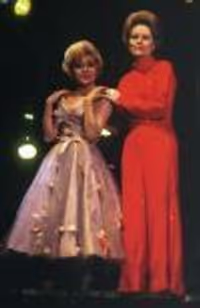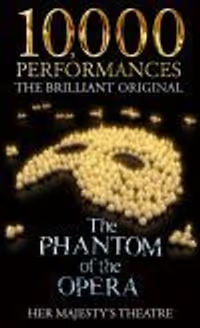Sondheim vs. Porgy & Bess - YIKES!
#200Sondheim vs. Porgy & Bess - YIKES!
Posted: 8/11/11 at 4:58pm
*And* they just sold another thousand tickets... ![]()
#201Sondheim vs. Porgy & Bess - YIKES!
Posted: 8/11/11 at 5:08pm
In regard to the opening lines of SHOW BOAT--
Hal Prince WANTED to use the original text. He was forced to change it.
Blactor
Understudy Joined: 8/11/11
#202Sondheim vs. Porgy & Bess - YIKES!
Posted: 8/11/11 at 5:27pm
I've been browsing these boards for quite some time...this is the first time I've felt sufficiently moved to weigh in.
Firstly, I will say that I've never seen "Porgy and Bess", and look forward to seeing this production despite whatever criticisms are levied against it; I will take the show with a grain of salt. Therefore, I won't comment on any specific content in the show. I WOULD, however, like to comment on the somewhat bizarre turn the thread took into the subject of race and stereotyping.
I don't mean to sound condescending, but white people often don't grasp the fact that any person of color in a play or film must bear the unfortunate burden of being representative of ALL the people of that particular culture/ethnicity. It's unfair, but it's true. For those of you who are baffled/upset as to why black people might find some of the characters in "Porgy and Bess" problematic, this is the reason. In a culture where we are continually marginalized, criminalized, alienated, and discriminated against, it simply is embarrassing to see negative portrayals of us on the stage and screen.
That said, I'm often of the mind that if a story is compelling and well-told, with complex characters, that should transcend any ethnic lines. For example, I don't find "The Wire"--with its black drug dealers and criminals--offensive, because these characters are complex; furthermore, there are protagonists of color to even things out.
To the misguided poster who claimed that Catfish Row could be anywhere, I must disagree--to be poor is something that many can relate to, and poverty DOES transcend ethnic lines. However, to be poor and black in this country, particularly during the time "Porgy and Bess" was written, was (and still is) a particular kind of misery. It is disingenuous to disregard the race of these characters; given the time when this piece was written, one must count race as a crucial given circumstance of these characters' lives. Otherwise, you diminish the depth and scope of these characters' experiences.
Lastly, the most "cringe-worthy" comment I've seen in this thread actually came from SeanMartin, who introduced race into the thread in the first place, with a comment along the lines of making the show "blacker", or something to that effect.
#203Sondheim vs. Porgy & Bess - YIKES!
Posted: 8/11/11 at 6:13pm
if a story is compelling and well-told, with complex characters, that should transcend any ethnic lines
Blactor--it might interest you to know that's exactly the artistic goal that George and Ira Gershwin and DuBose and Dorothy Heyward aspired to. African-American performers and critics have been debating the pros and cons of the characters and the stories since the novel was published in 1925. But no one denies that the intentions of the Heywards and the Gershwins were honorable, and productions of the opera have given thousands of black actors and singers employment since the play was first produced in 1927. For many, it was their first opportunity to do serious and complex work on Broadway and in major theaters and opera houses. As William Warfield, who played Porgy in the 1950s said, "Those of us in Porgy and Bess saw ourselves as playing only individual roles, and in no way did we play them as black stereotypes. It was art, and we were artists."
Many of those artists and performers went on to important careers that were launched in productions of Porgy and Bess.
For everyone interested in the show, this book by Hollis Alpert, published in 1990, is now out of print, but there are used copies available at Amazon and other places. It has incredible detail about Heyward's novel and play, the writing of the opera, the initial productions and tours up through the Houston Grand Opera and Met productions, and how the racial issues were perceived from 1927 through the 1980s. And it has over 100 photographs.

AMAZON.COM: The Life and Times of Porgy and Bess: The Story of an American Classic
#204Sondheim vs. Porgy & Bess - YIKES!
Posted: 8/11/11 at 6:32pm
PJ--what version of Porgy & Bess was in 1927? The original book? A non-musicalized play? The Gershwin/Heywood opera was first done in 1935 (8 years later), although a pre-"crash," pre-Depression version of this story fascinates me. It would change a lot of things from a general audience's POV.
And Blactor, thanks for weighing in. It's great to get another perspective on the race issue in question.
Speaking of the race issue in a modern "classic" musical ... was there this much controversy when Oscar Hammerstein's book was thrown out for the "Flower Drum Song" revival? (Or is that just not in the same league in certain eyes as P&B?) I seem to remember similar comments from the revival's creative team about the show being dated, the characters being caricatures, etc. David Henry Hwang and others were clear that it had to be "reinvented" and radically revised for today's audiences. Again, the estates fully approved of these drastic changes, but I wonder what Sondheim thought about it? It was his mentor's work they were "throwing out" and criticizing, after all.
blocked: logan2, Diamonds3, Hamilton22
#205Sondheim vs. Porgy & Bess - YIKES!
Posted: 8/11/11 at 6:33pm
>> Lastly, the most "cringe-worthy" comment I've seen in this thread actually came from SeanMartin, who introduced race into the thread in the first place, with a comment along the lines of making the show "blacker", or something to that effect.
Shall we pretend that wasnt a possible purpose? Dude, with all due respect, PORGY was written by a bunch of white guys. It's usually been directed and produced by a bunch of white guys. Now we have a black director coming along who says she's gonna "fix" it, and I'm sorry but that just leads smack to the conclusion that she doesnt feel it's sufficient "black", whatever that means to her or to you or to anyone else.
To sit there and berare me for introducing something terribly obvious into the thread... well, that's your issue, not mine. It was a pertinent question. If you feel otherwise, defend your position, but kindly do it without coming off as a victim. You want to pretend this isnt about race, and yet the rest of your post glistens with how it *is*... so which is it? Is it only okay when *you* make mention of it? Am I somehow at fault for raising a topic that everyone seemed hellbent on dancing around, when you yourself prattle on about how no one *understands* the black experience?
Sorry, not buying it. Have a nice day, bud.
#206Sondheim vs. Porgy & Bess - YIKES!
Posted: 8/11/11 at 6:36pm
Oh, dear ... good points on both sides.
But I'm stayin' outta this part of the argument.
blocked: logan2, Diamonds3, Hamilton22
#207Sondheim vs. Porgy & Bess - YIKES!
Posted: 8/11/11 at 6:47pm
PJ, thanks for reminding me about that book; I dug out my copy.
Besty, yes, it was a nonmusical version in 1927.
#208Sondheim vs. Porgy & Bess - YIKES!
Posted: 8/11/11 at 6:52pmI think I need to read this book.
blocked: logan2, Diamonds3, Hamilton22
#209Sondheim vs. Porgy & Bess - YIKES!
Posted: 8/11/11 at 8:28pmSo in this version, will be "I love you Porgy" and "I'm your woman now"?
#210Sondheim vs. Porgy & Bess - YIKES!
Posted: 8/11/11 at 8:42pm
I was very up in arms when they rewrote FLOWER DRUM SONG.
(and I am not Asian)
Hwang was suppose to undo stereotypes and then there were dancing Chinese take-out containers. And Madame Liang became a Dragon Lady.
Gaveston2
Broadway Legend Joined: 6/28/11
#211Sondheim vs. Porgy & Bess - YIKES!
Posted: 8/11/11 at 8:46pm
A page or two back, best12bars accuses me of hypocrisy for defending the rewriting of comedies while criticizing the rewriting of a tragic opera.
The difference is that some types of comedy are relevant only to their own times, as I pointed out, and there is an objective test for that: the laughter of the audience. When the books of musical comedies go out of date we know it--because the laughter dies.
Yes, yes, I know, it's possible that a particular production of a classic musical comedy is killing the laughs with bad staging. But we are speaking in general here.
FWIW, I didn't say no word of P&B could ever be changed. I objected to the quoted remarks of these collaborators that P&B requires "fixing."
------
ETA thanks to Blactor for pointing out the basic fact that "naturalism" isn't really a defense to charges of stereotyping. Do lazy black maids exist in the world? Gay serial killers? Probably, but I think you'd need a damn good reason for writing such characters nowadays, because they've been employed so often in the past they've achieved derogatory stereotype status.
But I hope Blactor will give SeanMartin and some of the rest of us a pass. We white folks don't get a handbook on how to discuss some of these issues.
---
Finally, yes, there was less of an uproar about "Flower Drum Song" because it was always a mediocre show and few cared if it was "fixed."
Updated On: 8/11/11 at 08:46 PM
mee.who
Understudy Joined: 10/6/08
#213Sondheim vs. Porgy & Bess - YIKES!
Posted: 8/12/11 at 1:30amOn a side note, they were putting up the marquee today at the Rogers, which I think is kind of premature considering it hasn't even opened out of town yet. Anyway, the poster is awful. It looks like a fun comedy rather than what it is. It's got cartoony lettering and bad coloring. I like the design of the ART version with the wood paneling behind the words. Why would they scrape that idea?
Blactor
Understudy Joined: 8/11/11
#214Sondheim vs. Porgy & Bess - YIKES!
Posted: 8/12/11 at 1:44am
PalJoey, thanks for the context of the piece. From what I've read on the piece, I know the authors had the best intentions in mind.
SeanMartin,
My initial reaction to your introduction of race into the thread was "Why?" Because to me, it did NOT seem like a pertinent question; the thread was about Sondheim's objections to the creative team's altering of the piece. YOU jumped to the conclusion that Suzan-Lori Parks (I assume you're talking about her, since, as was just pointed out to you, Diane Paulus, who IS the director, is white) is concerned with "blackening" up the piece.
That makes me wonder:
A) What do YOU believe "Black" to be?
At best it's a generality people use to differentiate dark-skinned people with "Negroid" features from people without those features. You clearly seem to think that there's not only some deeper, definitive "Blackness", but you also seem to know what it is. I'm glad someone has finally found the ultimate definition on just what BLACKNESS is--in my 28 years of being black, I hadn't figured it out. I've worked with Brandon V. Dixon, Patina Miller, John Douglas Thompson, Daniel Breaker, Chuck Cooper, and, yes, Ms. McDonald herself; those are all black people, and all are very, very, very, very unique. It's an insult to their individuality and mine to slap us all with this rigid notion of "Blackness". But again, I don't know what your notion of Blackness is. Maybe you can enlighten me, and then answer my second question:
B) How does one Black-ify (I'm coining that now) "Porgy and Bess"?
Or ANY work for that matter? There's a huge difference between wanting to deepen characters (which Ms. Parks' said she wanted to do, wrong-headed or not) and doing...whatever it is you think Ms. Parks is trying to do. It's a show featuring black characters. Not sure how much blacker they can make it beyond that point. When August Wilson revised his works--which he did extensively--was he working to further Black-ify his characters, or simply make them more dramatically satisfying? Lynn Nottage wrote an incredible play about African citizens; the characters, save one, are all black. How much blacker can they possibly be? Only SeanMartin knows the answer to that.
C) Lastly, if, say, Teresa Rebeck, or Terrence McNally, or whatever respectable white writer had made the exact same statement that Parks did, would we even be having this discussion? Would you even care?
SeanMartin, YOU seem to be the one with the bug up your behind about race. YOU are the one eager to make it about race. I took issue with what you said because I did NOT think race was central to what was being discussed in this thread.
Honestly, I think you really need to examine your feelings about black people in particular, because your willingness to dismiss what I said as self-victimization smacks of someone with a disdain or lack of respect for the feelings of black people. Brian Stokes Mitchell himself--of all people--has stated in interviews that minorities bear the burden of representation whenever they appear in a dramatic work. Rather than entertain that possibility, and why that might be so, you dismiss such notions.
Interesting, you're angry because of some notion that you can't speak on the black experience (which no one here asked you to do) yet your ideas of "Blackness", along with your immediate vitriolic dismissal of my expression of a point of view shared by COUNTLESS black performers, shows you to be completely unqualified to say anything about black people. Ever.
That said, I'm glad you stepped up to air your feelings. I still don't think race is central to Ms. Parks' remarks, but I'm glad you're standing up and saying what you really want to say. I'll continue to say what I really want to say.
We should all be this frank when it comes to race.
Q
Broadway Legend Joined: 11/3/05
#215Sondheim vs. Porgy & Bess - YIKES!
Posted: 8/12/11 at 1:55am
"How does one Black-ify ANY work for that matter?"
I'm curious if you saw the recent production of CAT ON A HOT TIN ROOF. I didn't see it, but a lot of what I read dealt with what many perceived as 'viewed through Black eyes', for lack of a better term.
Blactor
Understudy Joined: 8/11/11
#216Sondheim vs. Porgy & Bess - YIKES!
Posted: 8/12/11 at 2:23am
Never saw the show...definitely heard/read a lot of mixed things about it.
LOL I guess in that instance, blackification was the goal.
Updated On: 8/12/11 at 02:23 AM
Gaveston2
Broadway Legend Joined: 6/28/11
#217Sondheim vs. Porgy & Bess - YIKES!
Posted: 8/12/11 at 6:19am
Thank you, Blactor, for your continued patience and thoughtful explanation. I think any fair reader will see your point. I know I learned from it.
I think SeanMartin may have just used an unfortunate shorthand. Ms. Parks is noted and widely admired for her political awareness as well as her considerable talent and her ear for African-American dialects. She has been outspoken on issues of representation in the past and that is why I, at least, wondered if that was an issue here.
My thought process did not start with "black artists are trashing a classic by white writers just to be politically correct." My thinking started with "My black friends don't think the show is a fair representation. If I wanted to fix that, Parks would be a likely choice as adapter."
I don't speak for SeanMartin, but I was actually giving Parks the benefit of the doubt by thinking perhaps she is motivated by something more important than the superficial and largely commercial concerns articulated in the article.
But I am aware there is no universal black experience nor monolithic black culture. If Parks proves to have a better ear than Heyward for the people of Catfish Row, then more power to her.
Gaveston2
Broadway Legend Joined: 6/28/11
#218Sondheim vs. Porgy & Bess - YIKES!
Posted: 8/12/11 at 6:26am
On a different note entirely, what are the odds that somebody out there cares enough about the Gershwin brothers to buy a ticket, but doesn't already know they collaborated on "Porgy and Bess"?
My guess is no chance at all. I question whether the title change was thoroughly vetted by a qualified market-research team.
#219Sondheim vs. Porgy & Bess - YIKES!
Posted: 8/12/11 at 8:36am
Funny thing about the title change I got thumbing through my old copy of the Alpert book: In 1942, when producer Cheryl Crawford brought Porgy and Bess back to Broadway, she decided to change the name to (guess what?):
CHERYL CRAWFORD PRESENTS
THE GERSHWIN'S "PORGY AND BESS"
Ira Gershwin objected and intervened. He was quite eloquent that all the poetry in the lyrics were DuBose's, not his, and that Dubose was a true poet while he himself was just a lyricist, and that the opera was based on the play, which DuBose and his wife had written together.
He successfully insisted that Crawford change the billing to:
CHERYL CRAWFORD PRESENTS
GEORGE GERSHWIN & DU BOSE HEYWARD'S
"PORGY AND BESS"
(FOUNDED ON THE PLAY "PORGY" BY DUBOSE AND DORTHY HEYWWARD)


#220Sondheim vs. Porgy & Bess - YIKES!
Posted: 8/12/11 at 8:56am
What this show really needs is a cute little logo, like "H2$" had. Maybe "P&B!"
And adding an exclamation mark can help: "Porgy & Bess!"
Or a sponsor: "Pottery Barn Presents Porgy & Bess!"
blocked: logan2, Diamonds3, Hamilton22
#221Sondheim vs. Porgy & Bess - YIKES!
Posted: 8/12/11 at 9:04am
SeanMartin, YOU seem to be the one with the bug up your behind about race. YOU are the one eager to make it about race. I took issue with what you said because I did NOT think race was central to what was being discussed in this thread.
Race may not be the specifically stated tenor of this thread--or of the comments made by Misses McDonald, Parks, and Paulus--but race has certainly always been on the table when discussing the intentions of this particular work. At least it has been for black intellectuals, dating back to when WEB DuBois stated that Porgy and Bess COULD have been written about any race, but HAD to be written about the black race, because of time, place, and circumstance. So it's foolish to have this conversation believing that we can be completely ignorant of race or how it affects our conception of the piece, or how it might be handled in the hands of these new collaborators. No one might have explicitly made racialized comments in the Times piece, but when McDonald says that Bess "is not always a full-blooded character," in my mind she's saying that Bess is an archetype--a variation of the "tragic negress" one might find in the works of Nella Larsen or in Show Boat. Make of that what you will. SeanMartin might have phrased what he was trying to say better, but I don't think his premise--that several educated women of color, attuned to both the history of this piece and the history of race in America--might be trying to refocus the representation of certain aspects of the piece.
For the record, also, Diane Paulus is mixed race (Japanese and Caucasian) and has done some very profound non-commercial work that deals with racial construction in the past.
#222Sondheim vs. Porgy & Bess - YIKES!
Posted: 8/12/11 at 9:09am
The book jacket of Du Bose's 1925 novel:

After the play opened in 1927, Al Jolson did a short, authorized radio version and offered the Heywards $30,000 to option the story for a movie version, in which Jolson would play Porgy in blackface.
Heyward refused at first, because he had always fought against blackface, but with the success of Jolson's Jazz Singer talkie, Heyward relented.
Meanwhile, the Gershwins also saw the play, and George decided he wanted it to be his great American folk-opera. When the Jolson blackface movie failed to happen, the option expired, and Heyward was free to continue discussions with the Gershwins. But George was distracted and over-extended and unable to begin serious work.
In 1932, Al Jolson came back to Heyward a second time, again wanting to play the role in blackface. This time it would be a Broadway musical, and he had Oscar Hammerstein on board to write the libretto and Jerome Kern to write the music and the distinguished Theatre Guild (which had produced the play) again as producers.
Heyward appealed to Gershwin again, but Gershwin was still unable to initiate the project. George wrote to Du Bose:
“The sort of thing I have in mind is a much more serious thing than Jolson can ever do. If you can see your way to making some ready money from Jolson’s version, I don’t know that it would hurt a later version done by an all-colored cast."
For reasons we don't know, Hammerstein and Kern decided against writing the Jolson version, and in 1933, George phoned Du Bose to say he was ready to begin writing.
#223Sondheim vs. Porgy & Bess - YIKES!
Posted: 8/12/11 at 9:21am
^ Thank God!
I think if a blackface version of Porgy and Bess had made it to the screen, its future would have been very different. Back then, films came and went, and nobody (including Gershwin from his remarks) believed it would "hurt" their own stage version. Nobody realized the endurance of movies, including the studios themselves. They didn't think they were making "classics for the ages," and that's why many of them discarded old footage, cut into negatives, etc.
But a film version of Porgy & Bess in blackface by Jolson would likely still be very accessible now. Probably more so than the Gershwin/Heywood opera. It would likely be out on DVD and popping up on TCM all the time as part of a retrospective on either Jolson or race in the movies.
And it would leave a bitter taste in most people's mouths. I really think it would be hurting the opera's chances of modern productions far more than Gershwin ever would have imagined in his day.
So it's a very good thing that project never happened!
blocked: logan2, Diamonds3, Hamilton22
#224Sondheim vs. Porgy & Bess - YIKES!
Posted: 8/12/11 at 10:18amApologies if this has already been mentioned but I scan read some of it. The recent London revival of Porgy and Bess at the Savoy when Trevor Nunn tried to make it more of a musical was called The Gershwins Porgy and Bess so its not a new idea
Videos








